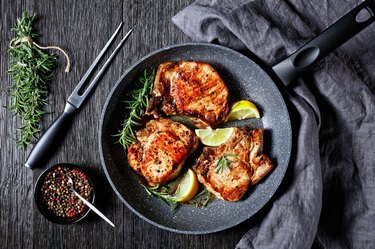
The only difference between a 1/4-inch- and 2-inch-thick pork chop is the length of cooking time. A thinner cut, whether it is from the loin, rib, sirloin, top loin or blade, can benefit from the same cooking methods and ingredients as its thicker counterparts.
However, because thin pork chops require extra attention to cooking time to make sure you don't overcook and dry out the meat, it's a good idea to use a method that gives you the most control over time and temperature — like in a skillet on a stovetop.
Video of the Day
Video of the Day
Things You'll Need
Pork chops
Utility knife
1 to 2 tsp. black pepper
Mixing bowl, small
2 to 3 tbsp. thyme, basil and/or oregano
1/4 to 1/2 tsp. garlic and/or onion powder
1 tbsp. Parmesan cheese, grated
Non-stick skillet
2 tbsp. olive oil
Tongs
Fork sensor meat thermometer
1 fresh lemon, cut into wedges
Disinfectant spray, soap or white vinegar
Instructions
- Trim off any excess fat, if any, from the edges of the pork chop with a sharp utility knife.
- Prepare a dry rub for the pork chops. Any rub that doesn't include salt can add flavor to pork chops. A dry rub can be a single ingredient — such as 1 to 2 teaspoons of pepper — or include multiple ingredients. For example, for an Italian-inspired flavor, combine pepper with 2 to 3 tablespoons of herbs such as thyme, basil or oregano, as well as garlic or onion powder and Parmesan cheese.
- Sprinkle as much or as little as you want on each pork chop, then use your hands to rub the mixture into meat.
- Let the pork chops sit for about five minutes to absorb the seasonings.
- Add olive oil to a non-stick skillet and heat on your stove top over medium high heat. Because it's important not to crowd the meat, the size of the skillet depends on the number of pork chops you're cooking. A 10- to 12-inch skillet is large enough to cook about 4 pork chops.
- Set the pork chops in the skillet using tongs and cook them for 2 to 3 minutes.
- Turn the chops with your tongs and cook them for an additional 2 to 3 minutes. The internal temperature of the meat should be at least 160 degrees Fahrenheit. Due to the thinness of the pork chop, you should use a fork sensor thermometer — rather than a traditional meat thermometer — to test for doneness.
- Transfer the pork chops to a serving platter with a clean pair of tongs.
- Serve with a few lemon wedges on the side.
Tip
Always wash your hands with hot, soapy water before and after handling raw pork. Disinfect any cooking utensils and surfaces — such as your cutting board and kitchen counter — with a commercial, kitchen-safe disinfectant spray, hot water and soap or undiluted white vinegar.
Related Reading